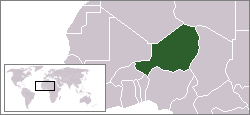LGBTQ rights in Niger | |
|---|---|
 | |
| Legal status | Decriminalized, criminalization pending [1] age of consent not equalised |
| Gender identity | No |
| Military | No |
| Discrimination protections | Limited protections based on sexual orientation |
| Family rights | |
| Recognition of relationships | No [1] |
| Adoption | No [2] |
Lesbian, gay, bisexual, transgender, and queer (LGBTQ) people in Niger face significant challenges not experienced by non-LGBTQ residents. Although same-sex sexual activity is legal, [1] the Nigerien LGBTQ community faces stigmatization among the broader population.